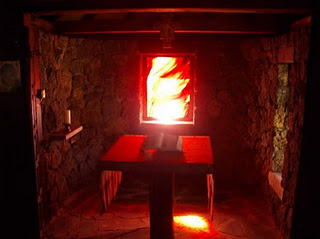 In today's second reading from Romans for Trinity Sunday the text read, [[Brothers and sisters: For those who are led by the Spirit of God are sons of God.For you did not receive a spirit of slavery to fall back into fear, but you received a Spirit of adoption, through whom we cry, “Abba, Father!”]] In my own parish the text was amended slightly to read, "For those who are led by the Spirit of God are sons and daughters of God."
In today's second reading from Romans for Trinity Sunday the text read, [[Brothers and sisters: For those who are led by the Spirit of God are sons of God.For you did not receive a spirit of slavery to fall back into fear, but you received a Spirit of adoption, through whom we cry, “Abba, Father!”]] In my own parish the text was amended slightly to read, "For those who are led by the Spirit of God are sons and daughters of God."
Now let me say up front that I completely understand that amended usage; in the 21st Century it is an important shift required to indicate the equal place of baptized women and men in the life of the Church; inclusive language is critically important. But to be honest, I believe in this single case, the original reading is as challenging to those glorifying masculinity over femininity as it is profoundly consoling to women who feel disenfranchised by the text's focus on sonship to the apparent (but only apparent) exclusion of daughterhood. I believe it is more effective theologically than the inclusive language version in calling us to a true Christian egalitarianism. In truth the text first addresses both Brothers and Sisters and then affirms that in the Holy Spirit God raises both male and female to the status of Sons of God in Christ, the only-begotten Son --- human anatomy, physiology, and gender politics of whatever stripe notwithstanding!! In other words, to be baptized each and all of us as Sons of God in Christ's own death and resurrection means this new identity we have assumed transcends human biology and gender. Moreover it transcends these while allowing and requiring their full expression. Therefore, while I only posted this at the beginning of the month, I believe I will close the month with it as well.
 Today's readings struck me in several places. One of these was the responsorial psalm whose antiphon we repeated several times: "You are my Son, this day I have begotten you." I know that many persons will change the language here so that it does not seem sexist but I think we have misunderstood what is being affirmed in this reading if we hear it in a sexist way. We are losing the countercultural sense of the usage in such a reading, blunting its sharpness and capacity to undercut our usual ways of seeing reality. Jesus made no distinctions between who became heirs of the Kingdom of God, whether women or men, no distinction based upon gender was involved here. Moreover to be called God's Son meant that one had been baptized into Jesus' own death and were indeed an heir to his resurrection and the Kingdom of God. The use of the term "Son" indicates an identity dependent upon and a literal share in Jesus' OWN Sonship, an identity we share in without losing our own unique masculine or feminine characteristics. It meant one was a new creation in whom godless death had been transfigured by the very presence of God. We, as heirs of this Kingdom have become responsible for proclaiming the Good News in season and out --- a good news that turned the gender-based society of the time on its head. (Please check out an original post on this subject: Driven into the Desert by the Spirit of Sonship)
Today's readings struck me in several places. One of these was the responsorial psalm whose antiphon we repeated several times: "You are my Son, this day I have begotten you." I know that many persons will change the language here so that it does not seem sexist but I think we have misunderstood what is being affirmed in this reading if we hear it in a sexist way. We are losing the countercultural sense of the usage in such a reading, blunting its sharpness and capacity to undercut our usual ways of seeing reality. Jesus made no distinctions between who became heirs of the Kingdom of God, whether women or men, no distinction based upon gender was involved here. Moreover to be called God's Son meant that one had been baptized into Jesus' own death and were indeed an heir to his resurrection and the Kingdom of God. The use of the term "Son" indicates an identity dependent upon and a literal share in Jesus' OWN Sonship, an identity we share in without losing our own unique masculine or feminine characteristics. It meant one was a new creation in whom godless death had been transfigured by the very presence of God. We, as heirs of this Kingdom have become responsible for proclaiming the Good News in season and out --- a good news that turned the gender-based society of the time on its head. (Please check out an original post on this subject: Driven into the Desert by the Spirit of Sonship)
The second place I was most struck was in the story of Jesus' farewell as he promises that he goes to the Father to prepare a place for us. So long as we think of heaven a some space separate from (though including) God Himself we will not understand how incredible this affirmation is but as we prepare for the Ascension and Pentecost we need to start thinking about this. Once upon a time our world had no room for God, and certainly not for a God who assumed human life and turned a human face toward us so that he might be fully revealed both in the sense of being made fully present and in the sense of being made fully known to us. This revelation of God walked among outcasts, ate with sinners (and here we mean BIG TIME sinners), touched the untouchable, made the rich poor and raised them to the humility of those who know they are loved by God no matter what! That has all been blunted somewhat by the Greek notion of God's omnipresence but we must see the original scandal, the terrible offense of such a God.
This, after all is God's will, the desire and intention that one day God will be all in all. It is a vision with cosmic scope but at the same time does not exclude the smallest portion of God's creation, not the greatest sinner or the most humble saint, the smallest virus or the largest star. As Sons of God we are part of a new creation which calls upon us to see with new eyes. Old exclusionary ways of doing business, conceiving of justice and of entrance into God's presence must be jettisoned as some of the baggage belonging to a different story and Kingdom.






















.jpg)











































